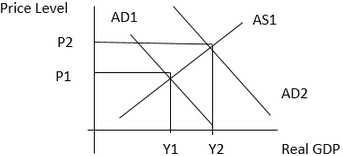Which of the following is evidence that consumption depends on total wealth, and not just on current income?
A) People save very little for their retirement.
B) The pre-announced phased-in tax cuts of 1981-83 caused little change in consumption in 1981.
C) A drop in consumer confidence, with unchanged current income, often causes total consumption spending to fall.
D) all of the above
E) none of the above
C
You might also like to view...
Use the following diagram to answer the next question. Which of the following best describes the short-run effect of the change shown in the diagram?
Which of the following best describes the short-run effect of the change shown in the diagram?
A. The unemployment rate rises, but the rate of inflation falls. B. The unemployment rate falls, but the rate of inflation rises. C. Both the unemployment rate and the rate of inflation fall. D. Both the unemployment rate and the rate of inflation rise.
The balanced budget multiplier is
A) positive because the magnitude of government expenditure multiplier is larger than the magnitude of tax multiplier. B) negative because the magnitude of government expenditure multiplier is larger than the magnitude of the tax multiplier. C) positive because the magnitude of government expenditure multiplier is smaller than the magnitude of tax multiplier. D) equal to zero. E) negative because the magnitude of the tax multiplier is larger than the magnitude of the government expenditure multiplier.
Distinguish the laws of demand and supply. How are the laws of demand and supply illustrated graphically?
According to the capture hypothesis of regulation
A) regulation favors producers over consumers because the producers were able to pay off the regulators. B) regulation eventually favors producers over consumers because the producers have more at stake than individual consumers. C) regulation benefits the regulators and the legislators who support the regulation by enabling them to obtain favors from both producers and consumers. D) regulation benefits the consumers over producers because the number of consumers is greater than the number of producers, giving the consumers more political clout.